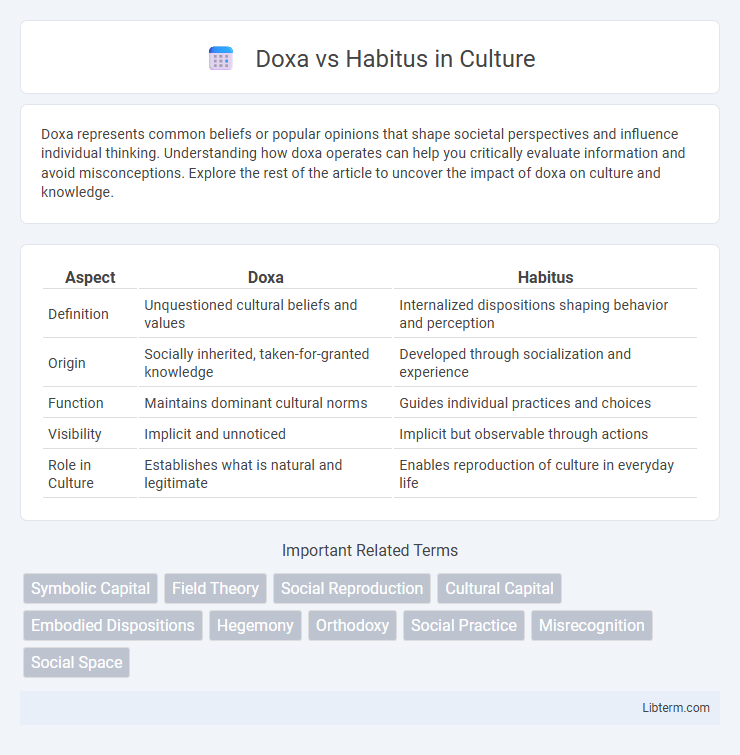Doxa represents common beliefs or popular opinions that shape societal perspectives and influence individual thinking. Understanding how doxa operates can help you critically evaluate information and avoid misconceptions. Explore the rest of the article to uncover the impact of doxa on culture and knowledge.
Table of Comparison
| Aspect | Doxa | Habitus |
|---|---|---|
| Definition | Unquestioned cultural beliefs and values | Internalized dispositions shaping behavior and perception |
| Origin | Socially inherited, taken-for-granted knowledge | Developed through socialization and experience |
| Function | Maintains dominant cultural norms | Guides individual practices and choices |
| Visibility | Implicit and unnoticed | Implicit but observable through actions |
| Role in Culture | Establishes what is natural and legitimate | Enables reproduction of culture in everyday life |
Understanding the Concepts: Doxa and Habitus
Doxa refers to the set of deeply ingrained beliefs and values that individuals accept as self-evident within a particular social field, shaping perceptions without question. Habitus is the durable, transposable disposition formed through lived experiences that guides actions, thoughts, and tastes across various contexts. Understanding doxa and habitus reveals how social structures internalize within individuals, influencing behavior and maintaining social order through subconscious adherence to accepted norms.
Origins and Theoretical Foundations
Doxa and habitus originate from Pierre Bourdieu's sociological framework, where doxa refers to the entrenched beliefs and values accepted as self-evident within a social field, while habitus describes the ingrained habits, skills, and dispositions shaped by one's social environment. Doxa represents the unquestioned truths that maintain social order, rooted in collective accepted norms, whereas habitus embodies individual and collective practices developed through lived experiences and social conditioning. The theoretical foundation highlights the dynamic interaction between external social structures (doxa) and internalized dispositions (habitus) in reproducing social realities and power relations.
Pierre Bourdieu’s Perspective
Pierre Bourdieu's perspective distinguishes doxa as the set of unconscious, taken-for-granted beliefs and values within a social field, while habitus represents the durable dispositions and internalized practices shaped by past experiences. Doxa functions as the unchallenged norms that structure social realities, whereas habitus enables agents to navigate and reproduce these social structures through embodied actions. Together, doxa and habitus explain how power relations and social orders persist through implicit acceptance and habitual behaviors.
Key Differences Between Doxa and Habitus
Doxa refers to the set of commonly accepted beliefs and opinions within a society that shape individuals' perceptions and behaviors subconsciously, while Habitus represents the deeply ingrained dispositions and habits formed through personal experiences and socialization processes. Doxa operates at the collective level, influencing what is considered "normal" or "natural," whereas Habitus functions at the individual level, guiding how people act and react in various contexts based on their internalized social structures. Key differences include doxa's role in establishing societal norms versus habitus's role in shaping individual practices and the embodiment of social conditions through lived experience.
The Role of Doxa in Social Structures
Doxa represents the taken-for-granted beliefs and norms embedded within social structures, shaping individuals' perceptions and behaviors without conscious awareness. It functions as the invisible framework that maintains social order by guiding acceptable practices and reinforcing power relations. Through internalizing doxa, members of society reproduce existing hierarchies and institutional stability, making it crucial for understanding social cohesion and control.
Habitus: Shaping Individual and Collective Behavior
Habitus, a concept developed by Pierre Bourdieu, refers to the deeply ingrained habits, skills, and dispositions that individuals acquire through their life experiences, shaping both individual and collective behavior. It operates as a system of durable, transposable dispositions guiding perceptions, thoughts, and actions within social fields, influencing how people navigate social structures unconsciously. Unlike doxa, which represents taken-for-granted beliefs and common sense, habitus dynamically molds responses and practices, perpetuating social norms while allowing for subtle variations based on personal history and context.
Interplay Between Doxa and Habitus
Doxa represents the ingrained, unquestioned beliefs within a social field, while habitus encompasses the deeply internalized dispositions shaped by past experiences. The interplay between doxa and habitus continuously molds individual perceptions and behaviors, reinforcing existing social structures and power dynamics. This dynamic relationship ensures that social norms are both produced and reproduced through everyday practices and embodied actions.
Doxa and Habitus in Everyday Life
Doxa refers to the ingrained beliefs and taken-for-granted norms shaping everyday perceptions and actions within a social field, while habitus encompasses the deep-seated dispositions formed through past experiences that guide behavior unconsciously. In everyday life, doxa manifests as the unquestioned common sense influencing individuals' social practices, reinforcing power structures without explicit awareness. Habitus operates through these internalized schemas, allowing people to navigate social environments seamlessly, perpetuating doxa through habitual actions and reactions.
Implications for Social Change and Power Dynamics
Doxa represents the deeply ingrained beliefs and norms that reproduce existing social structures, while Habitus reflects the internalized dispositions shaping individual behavior within those structures. The interplay between Doxa and Habitus reinforces power dynamics by legitimizing dominant ideologies and limiting transformative agency. Challenging Doxa requires disrupting Habitus, enabling social change through critical reflexivity and collective action that reconfigure power relations.
Conclusion: Relevance of Doxa and Habitus Today
Doxa and habitus remain crucial in understanding social behavior and cultural norms, as doxa represents ingrained societal beliefs while habitus reflects individuals' dispositions shaped by those norms. These concepts highlight how social structures perpetuate through unconscious practices and shared worldviews, influencing identity, power relations, and social reproduction. Their relevance endures in contemporary sociology, critical theory, and cultural studies for analyzing the persistence of social inequalities and cultural continuity.
Doxa Infographic

 libterm.com
libterm.com